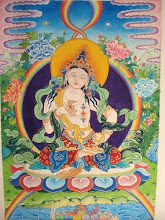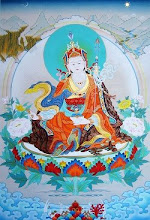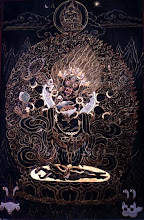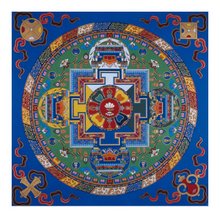 As presented in broad strokes by first time Bhutanese director Neten Chokling, the story of one of Tibet's greatest saints is reduced to its bare outlines - the evil relatives who usurp Milarepa's inheritance and leave his family in poverty, his mother's dream of revenge, Milarepa's training in the dark arts, his revenge on his relatives, and his eventual turn to Buddhism to alleviate his guilt.
As presented in broad strokes by first time Bhutanese director Neten Chokling, the story of one of Tibet's greatest saints is reduced to its bare outlines - the evil relatives who usurp Milarepa's inheritance and leave his family in poverty, his mother's dream of revenge, Milarepa's training in the dark arts, his revenge on his relatives, and his eventual turn to Buddhism to alleviate his guilt.Very little of the story is fleshed out. We don't understand how Milarepa's uncle is able with impunity to confiscate his brother's wealth, nor why his wife continues to live in her brother-in-law's home, even though her family has been reduced to near beggary. Are there no other family members or villagers to speak on their behalf? Why is the uncle is so villainous to his sister-in-law and her children? How is he able to silence an entire village?
Milarepa's mother seems like the typical self-effacing Asian woman and the actress who plays her brings such quiet reserve to the part it's hard to believe her turn into the spiteful harpy who drives her son to learn sorcery and threatens to kill herself unless he makes the uncle suffer.
We never learn what Milarepa thinks about all this. He moves around as directed by the other players. For a character with so little self-motivation, the actor who plays him turns in a surprisingly appropriate performance. From beginning to end he maintains the same confused and slightly open-mouthed expression.
While the story has great mythical qualities, the film is shot in a fairly straightforward manner. Director Chokling and his director of photography Paul J Warren have in the mountain scenery of India's Himmachal Pradesh a magnificent setting, one that in it's soaring peaks and vast empty landscapes suggests a world rich in the supernatural. Very little else does. There are some fairly simple special effects - levitating rocks, running at high speeds, the conjuring of a storm - but no great panning shots, no off-centered camera angles, no filters, fuzzy edges, or high contrast.
Besides being a fairly pedestrian take on the legend of Milarepa, the film is also at times something of a disappointment for missed opportunities. Director Chokling is a Buddhist lama, a person of some scriptural and spiritual authority, who should be using what opportunities he has to again remind the world of the Chinese occupation of Tibet. With a little finesses and sensitivity, the thieving uncle ruining Milarepa's fatherless family could have been written as the Chinese taking advantage of the leaderless Tibetans.
If you know absolutely nothing about Milarepa, this might be an interesting place to start learning something about him. It's certainly a better film version than the 2006 Taiwanese production from director Sonam Rinpoche. Still, you'd likely learn more from some of the more interesting written accounts, plus you'd get the full story. The film takes the viewer up only until Milarepa's decision to seek a Buddhist master. The second part of the story is scheduled for a 2009 sequel.
#



























0 comments:
Post a Comment